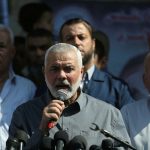‘Trump Has Ability to Twist Arms’: Israelis React to President’s Remarks on Relocating Gazans
Jerusalem, 5 February, 2025 (TPS-IL) -- Israelis were surprised and happy by US President Donald Trump’s suggestion to move Palestinians out of Gaza to rebuild the Strip. But one analyst stressed to The Press Service of Israel that such a scenario might take a long time to unfold.
“I think Trump’s moves could be good for Israel if he doesn’t overdo it with his extremism and do something that will be bad for the whole world, not just Israel,” said Guy Sasson, a salesman at a Jerusalem bakery. “Between that and the fact that he’s currently making moves that are good for Israel, that’s perfectly fine and I’m determined. Just don’t overdo it.”
Only time will tell if it’s the right move, Sasson insisted. “Bad, good, that’s a matter, we will only know after they make the move,” he said.
Jerusalem shoe store owner Avi Avrahami told TPS-IL that as far as he is concerned, all the Palestinians in Gaza are terrorists.
“They’re all terrorists. Why am I telling you this? In the year and a half [since Hamas’s October 7 attack], the people who live there — no one stood up [and said] ‘Tell them [Hamas] to stop, we want to live properly, we don’t need war.” Avrahami said. “But no one from there stood up. And nothing helped.”
He added, “Okay, do you want to live in our country? Live in peace. That’s good. You don’t want to live well? Then get out of here.”
Appearing at a joint press conference in the White House on Tuesday night with visiting Israeli Prime Minister Benjamin Netanyahu, Trump said the US would “take over” and “own” the Gaza Strip to rebuild it. Calling Gaza “a big pile of rubble” and a “hell hole,” the President insisted that there was “no alternative” but for Palestinians to leave Gaza.
Twisting Arms
Asked to share his thoughts on Trump’s remarks, Asher Fredman, executive director of the Misgav Institute in Jerusalem said voluntarily relocating Palestinians to third countries while the US rebuilds the Strip could be done, but it would require the right circumstances.
“Gazans won’t be able to leave in large numbers if Hamas gunmen are stopping people from leaving,” he told TPS-IL. A military campaign would first have to weaken Hamas enough to keep it from barring Palestinians from emigrating.
“But there won’t be military operations against Hamas while [ceasefire] negotiations are ongoing during the second or third stage of the hostage deal. I don’t see Hamas releasing all of the living hostages in any scenario because they know that Israel would strike the next day once all the hostages are out. Tragically, they’re going to keep a few of the hostages as insurance.”
As a result, opening the exits, “gets put into motion if and when the hostage negotiations break down,” he said. “At some point, Israel will come to the conclusion that Hamas isn’t fazed, its demands are too great.”
Asked if the idea is realistic, Fredman said that despite the public Palestinian rhetoric, many Gazans do want to leave Gaza. He cited a Palestinian Center for Policy and Survey Research survey published on June 26, 2024, which found that 44% of Gazans ages 18-29 would emigrate if given the chance. The reported noted, “Among those [of all ages] who have considered emigrating, 30% say they would do so even if they did not have the required papers.”
A 2022 report, written by the Hamas-affiliated Council on International Relations and seen by TPS-IL, said 12% of the Strip’s population fled since 2007, when the terror group violently seized control of Gaza.
“It does appear that President Trump is committed to the idea. He has the ability, if he wants to, to twist Jordan’s arm, to twist Egypt’s arm. Jordan is so dependent economically on the US and free trade with the US – which is more beneficial to Jordan than the US – that if President Trump really wants to make this happen, the US has the power to make it happen,” Fredman said.
The ongoing first phase of the ceasefire is supposed to see a total of 33 Israeli hostages freed over six weeks in exchange for hundreds of Palestinian terrorists imprisoned in Israel. The exact number will depend on how many are alive. So far, 18 hostages — 13 Israelis and five Thais — have been released.
The fate of the remaining 65 hostages will be determined by negotiations during the ceasefire’s second phase. Critics say the phased approach condemns hostages not freed in the beginning to open-ended captivity and undermines Israel’s war gains.
At least 1,200 people were killed, and 252 Israelis and foreigners were taken hostage in Hamas’s attacks on Israeli communities near the Gaza border on October 7. Of the 79 remaining hostages, 35 have been declared dead.







